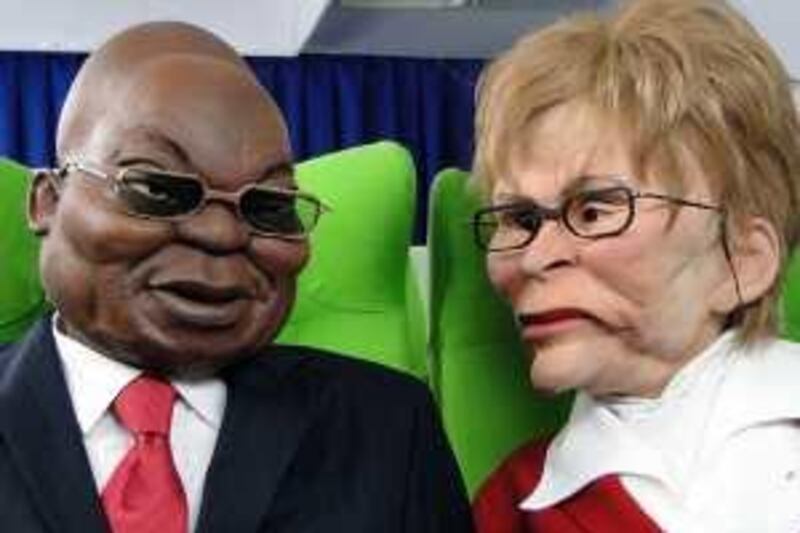JOHANNESBURG // Sitting in dated brown armchairs in front of a television, cups of tea on a stool in front of them, Desmond Tutu, the archbishop emeritus of Cape Town, and Nelson Mandela, former president of South Africa and leader of the struggle against apartheid, lament the continuing existence of racism in their country. "I don't know what to say," says the priest. "You always have something to say, and it was your bright idea to call it the Rainbow Nation, wasn't it?" retorts the politician.
"Well, it's not my fault if there is no black in the rainbow," replies Mr Tutu, who is seen as the country's moral conscience. "Or white either," says his fellow Nobel Peace Prize laureate. "Stupid racist rainbow," comes the response. It is not, of course, reality, but a scene from the one of the first episodes of ZA News, a satirical puppet show in the mould of the UK's Spitting Image that launched in South Africa last week, after years of delays.
The humour is gentler than in the British original, and the caricatures, inspired by the drawings of Zapiro, South Africa's most prominent cartoonist, less harsh - although an indecisive Thabo Mbeki is portrayed ordering a cocktail that is replete with references to his political past: "Bartender, tell you what, give me a Quiet Diplomacy [his engagement with Robert Mugabe in Zimbabwe]. No, that doesn't do anything. I know, give me an African Renaissance. No, no, that never arrives. Wait, wait, wait - I've got it. Won't you give me a Polokwane Surprise [the ANC conference where he was ousted as party leader]? It's vodka, sour grapes, crushed ice and then you stab it in the back when it's not looking!"
Non-ANC figures are also targeted. The show takes the form of a spoof news broadcast and in one sketch the presenter asks of the leader of the opposition Democratic Alliance: "Is Helen Zille's face a national security threat?" Nonetheless the show's making has proved hugely controversial, to the extent that the South African Broadcasting Corp (SABC), which originally commissioned a pilot programme but never broadcast it, has declined to show it.
Instead, it is being streamed online by the independent Mail and Guardian newspaper and a number of other websites. At least once in each episode the presenter says: "You're watching ZA News on the internet, because here we can." More than 50,000 people downloaded the programme in its first two days - there are four episodes a week plus a weekend omnibus - and reactions have been overwhelmingly positive, according to the makers, but it is a tiny fraction of the audience that could be reached on television.
The situation is grist to the mill of opposition politicians and media activists who say the state broadcaster has been increasingly politicised in recent years, and plagued by self-censorship and cowardice rather than "speaking truth unto power". "It should be on SABC," said Faiza Smith, director of the Media Institute of South Africa. "It must be; who will have access to the internet?" There were no politically independent appointees to the new SABC board, she pointed out. The organisation, she argued, should be concentrating on "what a public broadcaster means and just do their job instead of thinking what the repercussions will be".
Anton Harber, Caxton professor of journalism at Witwatersrand University, said: "The SABC lacks the self-confidence and capacity to do anything which might be controversial. It has been politically emasculated. It has become too weak, too unable to defend itself, too lacking in leadership to push any boundaries. "Most of the media - and certainly the public broadcaster - are too nervous and cowardly to take on those with power." The South African public, Mr Harber said, was able to appreciate satire.
In a culture that traditionally respects its leaders and elders, Dali Mpofu who was chief executive of the SABC when the pilot was produced, declared: "Our people are not ready for this," according to Thierry Cassuto, the programme's producer. "How can a broadcaster ever say that?" Mr Cassuto asked. "I think that's very patronising and shows disrespect for the audience and the citizens of this country."
He acknowledged that his puppet caricatures were less abrasive than those of Spitting Image, but added: "The SABC is very, very sick, in the sense that it could be on its death bed. It has no spirit any more, its integrity is in question as a state institution." Zapiro, whose real name is Jonathan Shapiro, is being sued for libel by Jacob Zuma, now South Africa's president, Mr Cassuto pointed out, and he believes that context meant the programme was not considered on its own merits.
"It was a litmus test for democracy and the SABC. The SABC obviously failed that litmus test, but the good thing is South African democracy did not. I feel so happy that we are completely free on the internet." This year the SABC's spokesman, Kaizer Kganyago, said the showing of a documentary on political satire that included clips from the never-broadcast pilot had been postponed because some of its content could be seen as libellous. He did not respond to requests for comment.
@Email:sberger@thenational.ae





